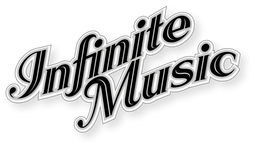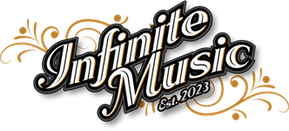What Do Guitar Effect Pedals Do?
Posted by ROB LAMBERTI

As a new year rolls in, many of us make those pesky little new year's resolutions. Whether it’s to eat healthier, exercise more or save money, often by the end of January our goals are long forgotten.
If your New Year’s resolution is to learn an instrument, get started on the right foot with lessons at the Infinite Music School in Nambour, Sunshine Coast.
Our school caters to students of all ages and skill levels, with music teachers for nearly every instrument.
To get you ready, here are some tips to make sure you reach your new years music goals!
Choose an Instrument
Okay I know this may sound obvious, but 1st you need to choose your instrument.
Crazy I know.
Many people will already have a passion for a certain instrument, whether it’s the piano, drums or a bass guitar.
For others, this choice may be a little bit harder. If you’re stuck choosing between two different instruments, or you just have no idea, then coming in store is a great idea.
You can explore the range of musical instruments available, and figure out which one sets your heart on fire.
You might fall in love with the piano, and want piano lessons. Or maybe you’ve got a keen interest in jazz rock and want to pick up an electric guitar.
Whatever your choice, Infinite Music can help you find the best instrument for you.
Practice Practice Practice
Even if it’s just a little bit each day, practicing is the key to developing any new skill.
Don’t be disheartened if you sound awful in the beginning and it seems to take forever to get the hang of it. Afterall, sucking at something is the first step to getting good at it.
If you stick with practicing, you will eventually develop your skills.
You just want to make sure that you don’t develop too many bad habits early on, which is why getting professional music lessons is a great idea.
Music theory can be helpful, but your practical skills and technique are going to be your number one priority.
Have Fun
It may sound cheesy, but learning an instrument should be fun! The more fun you have with your instrument, the more motivated you will be to practice and perfect your skills.
Whether it’s through experimenting with different styles, or playing songs you enjoy, developing a love of music is going to help you improve.
You could have all the musical knowledge in the world, but if you don’t actually enjoy yourself, then it will show in your music.
We teach students how to play their instruments, but also how to appreciate and develop a love for music as a whole
Develop Your Skills
Music programs are a great way to develop your skills, no matter what level you are at, or where you are on your music journey.
You may already know how to play your instrument, but want to learn the skills needed to perform on stage, or branch out into a different genre.
The Infinite Music school offers one on one lessons, or small groups can be arranged upon request.
Contact the team, to arrange your next lesson and start your year right with some music education!
Guitar pedals have fondly been nicknamed stompboxes, because well, they're a little electronic box that you stomp on. Straight forward… right?
Well the nickname may be the simplest part of these little pedals. Once you start diving into the world of guitar effects you might start to get a little overwhelmed with all the different pedals and multi-effects available. There is A LOT happening, and to a novice or beginner it starts to sound like a foreign language.
So, if you’re also feeling overwhelmed, or just wanting to learn a little more, take a deep breath. We’ve got you covered. Here is our guide to understanding what guitar effect pedals do.
What are guitar pedals used for?
A guitar effect pedal is an electronic device used to alter the sound of a musical instrument, letting you get the most out of your guitar's tone.
Pedals can simply improve your overall sound quality, or create whole new layers and sounds from your instrument.
For any guitar player wanting to really explore their range, pedals are going to help you out a lot, as they can add emotion, amplify noise, alter frequencies and do so much more to transform the sound of your instrument.
Do you need a stompbox or a multi-effects unit?
When it comes to whether you should get a good old fashioned stompbox or a multi-effects unit, it all comes down to personal choice and music taste.
They’re both good and used for different reasons!
If you just like to keep it simple, and don’t need a whole ton of different sound options, then a simple pedalboard setup with a handful of pedals, a good compressor, a great electric guitar, and a tube amp with some spring reverb is going to give you plenty to play around with.
If you perhaps want to get a bit more experimental, and you want a more versatile rig with more options, a high quality multi-effects unit is probably more up your alley. It will most likely be bigger and more expensive outright, but you can get access to a whole lot more effects without having to overcomplicate things.
Common types of pedals & their sound
There are plenty of different pedals out there, so to help you gain a better understanding of them, we have outlined some of the common types of pedals and the effects they create.
Overdrive & Distortion Pedals
The distortion pedal is one of the most used and well known of the guitar pedals. It adds volume and more saturation which alters the tone and sound of your guitar. It’s often used in a song's chorus to create a contrasting sound to that of a natural guitar. Distortion pedals have become a staple in heavy metal music, due to the harsh sounds you can create with it.
An overdrive pedal, often confused with the distortion pedal, is used to mimic the sound of you turning your amp up as loud as it can go, without the potentially detrimental effects of actually doing this. The overdrive pedal doesn’t change your existing sound that much, just makes it sound a bit heavier.
Reverb Pedals
Many amplifiers come with a built in reverb effect, but for some that doesn’t quite achieve the desired tone they’re aiming for.
The reverb pedal creates that big expansive sound that reverberates off the walls. You can use it to create a dreamy effect, or make it sound like you’re in a cave. It adds life and fullness to your sound with the echo-like effect.
It is a staple in many different genres of music, for the clean sound it can help elevate. Many different types of reverb exist, such as spring, plate, modulated and shimmer.
Delay Pedals
The delay pedal does exactly what it says in the name. It replicates the sound you make from your guitar, like a chord, and repeats it after you stop strumming. You can play the note back once, or multiple times.
Adjust your settings and you can play around with the different effects this pedal gives you access to.
Fuzz Pedals
Fuzz pedals are named for the fuzzy sound that they create. The Fuzz pedal makes it sound like you are pushing your amplifier to the extreme, altering the sound to a plain square wave with amazing sustain.
They distort the sound in a way that is different and unique from a regular distortion pedal, creating that noisy and fizzy sound.
Wah Pedals
This one is pretty straightforward. It’s all in the name: wah. The wah pedal makes a ‘Wah’ sound. Iconic examples of this pedal include Jimi Hendrix’s ‘Foxy Lady’ and Pink Floyd’s ‘Echoes’.
The emotion and sound created by this amp has caused manufacturers such as Dunlop to create the Cry Baby Wah Pedal, which are now among the most famous of these guitar pedals.
Chorus Pedal
A chorus pedal sounds like the same signal running through two amps with a slight delay between them, and a subtle pitch difference. The effect can make it sound like you are playing with a variety of other musicians.
It’s a staple from 80’s music, with The Police giving it a kickstart in 1979 with ‘Walking On The Moon’.
Synth Pedal
Ready to get weird and out of this world? The Synth is the pedal for you then. It makes your guitar sound like a massive synthesizer, helping you achieve those otherworldly tones in your music.
Think ‘Ashes to Ashes’ by David Bowie.
Tuner Pedal
This isn’t an effect pedal, but it’s still essential nonetheless. The tuner pedal allows you to tune your guitar in a more reliable and accurate way than a clip on tuner.
Use it to tune your guitar, and it can even keep the noise quiet for you while you do it.
Volume Pedal
A volume pedal is a great option for a guitarist who wants to use volume swells or fade-ins. It’s incredibly simple to use and doesn’t change the tone of your music.
This isn’t even a full list of the pedals available, but it should definitely give you a head start now!
You can check out the rest of the guitar pedals available at the Infinite Music online store, or you can come visit us in store at Nambour, Sunshine Coast.
The team is always happy to help and chat to you about music, and if your head is reeling from all this information, we can help mellow it out a little.


